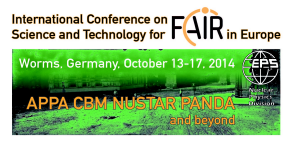Sprecher
Dr.
Alexander Botvina
(FIAS, Frankfurt am Main)
Beschreibung
Investigation of hypernuclei is a rapidly progressing field of nuclear
physics, since they give opportunities both to improve methods of
traditional nuclear studies and to open new horizons for studying particle
physics and nuclear astrophysics. Within dynamical and statistical
theories we study the main regularities in the production of hypernuclei
emerging from the projectile and target residues in relativistic ion
collisions. This process will also allow to understand the mechanisms of
peripheral collisions and the properties of hyper-matter of low temperatures,
including hyperon-hyperon interactions at low energies. We demonstrate
that the yields of hypernuclei increase considerably at beam energies
above the energy threshold for Lambda hyperons (~1.6 AGeV), followed by a
saturation for yields of hypernuclei with increasing the beam energy up
to few TeV [1]. These hypernuclei have a broad distribution in masses and
isospin. They can even reach beyond the neutron and proton drip-lines
since they are stable with respect to nucleon emission [2]. Weak decay of
such hypernuclei may lead to formation of normal nuclei beyond the
drip-lines also, thus providing a unique chance for reaching the islands
of stability on the nuclear chart. The production of specific hypernuclei
depend strongly on the isotopic composition of the projectile, therefore,
it will be possible to obtain exotic hypernuclei that may be difficult to
reach in traditional hypernuclear experiments [1]. We show also new
calculations including DCM, UrQMD, and HSD transport models, the coalescence
model, and the statistical model, with formation of light hypernuclei at
all rapidities and large hyper-residues. The perspectives of hypernuclear
studies involving these novel processes at the present accelerators are
discussed.
[1] A.S. Botvina, K.K. Gudima, and J. Pochodzalla,
Phys. Rev. C88, 054605 (2013).
[2] N. Buyukcizmeci, A.S. Botvina, J. Pochodzalla, and M. Bleicher,
Phys. Rev. C88, 014611 (2013).
Autor
Dr.
Alexander Botvina
(FIAS, Frankfurt am Main)

